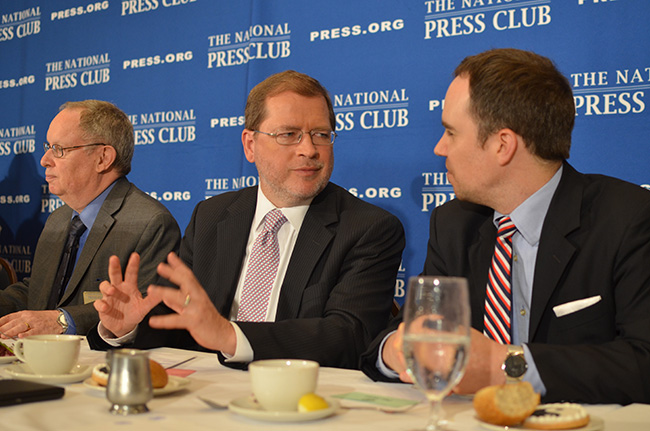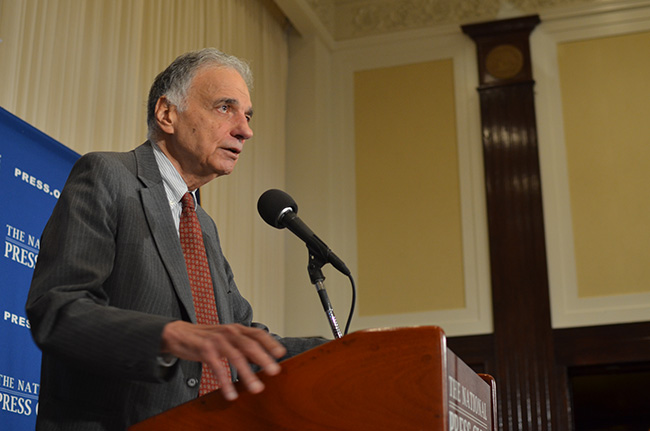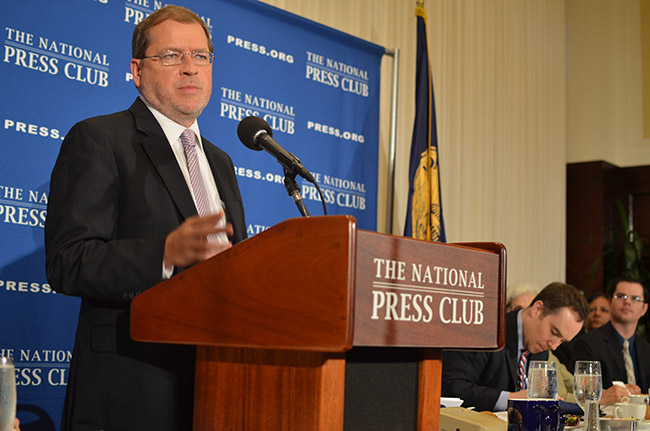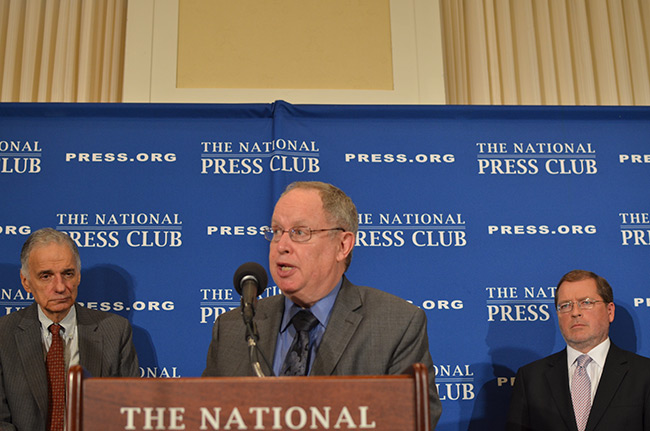| Nader
and
Norquist
Say Left and Right Can Agree on Some Areas...1 of 1 > |
| Sept. 4, 2014 -- Consumer advocate Ralph Nader and Grover Norquist, founder and president of Americans for Tax Reform, spoke at a National Press Club luncheon on the topic of areas where the right and left can agree. Introducing the two, National Press Club president Myron Belkind said that despite their differences Nader and Norquist both have worked for "good, responsive government." Each man spoke for about 12 minutes and then they took questions. |
 |
 |
 |
 |
 |
| Nader described "an immobilized society" and said public sentiment forms the basis for left-right consensus. He recalled an early example of convergence in 1983 when the Senate voted against continuing the Clinch River Breeder Reactor project despite support from President Reagan and Senate Majority Leader Howard Baker. Another example occurred in 1986 with changes to the False Claims Act. "This is not pie in the sky," said Nader. In writing his book Unstoppable: The Emerging Left-Right Alliance to Dismantle the Corporate State (Nation Books, April 2014), Nader said he had reviewed the work of conservative philosophers and found doctrinal basis for agreements. Nader identified procedural and substantive areas of agreement. Among the issues he cited were civil liberties, wars, crony capitalism/bailouts and the Patriot Act. |
 |
 |
 |
| Norquist differentiated between
bipartisan agreements on subjects such as congressional pay raises and
earmarks and subjects on which the right and the left can agree on
principle. He cited transparency as an obvious area of
agreement. Other issues he cited included term limits, reforming
mandatory mininum sentencing, corporate welfare, defense spending, and
civil liberties. Norquist said that with Republicans set to gain
the majority in the Senate and retain control of the House, while
President Obama retains the White House, the situation for the next two
year will be comparable to
two sumo wrestlers coming up against each other. Thus "on
the mega issues, nothing moves," Norquist said. Any
success will come from smaller issues where the right and left can
agree. |
 |
| After their remarks, Nader and
Norquist fielded questions. They were particularly passionate in
rejecting stereotypes. When Belkind prefaced a question to Nader
stating, "Your 2000 race for president, it is widely acknowledged,
threw
the election to George W. Bush," Nader responded forcefully. "I
don't think third parties are second class citizens," he stated.
He said one could blame the Electoral College, blame "the thieves in
Florida," and blame the Supreme Court. "You don't blame someone
exercising constitutional rights to challenge the two parties on at
least 15 issues that they are totally ignoring, will not discuss, but
have majoritarian support." Returning to the subject in his
answer to a subsequent question, Nader exclaimed "Get over it.
Stop scapegoating the Green Party." Norquist clarified a questioner's assertion that it was his "dream of drowning goverment in a bathtub." "The actual quote is you want the government to be small enough to where you can drag it in the bathtub and drown it in the bathtub. It's a question how its size, it's not a question of intent, for dramatic effect." Next, a questioner on abortion rights characterized him as "someone who hates government." Norquist rejected the view that he is "anti-government." "This is the oddest thing, when people who want a limited government are called anti-government, okay. Cancer doctors are not anti-cell, okay. They like cells. Some cells are healthy and they just sit there, some are very cheerful and they do good things, some cells reproduce so quickly they hurt you and can kill you... There's a big difference between disagreeing with any government and not liking big government." Both were asked if they could "conceivably back a left-right candidacy like a Ron Paul-Dennis Kucinich ticket." Norquist was amused, and said it was unlikely to occur in a presidential race, but that pairings on individual issues were helpful. Nader had some unfavorable words for the Clintons. "The Clintons are now on the record. They are Wall Street, they are corporatists and they are militants. Hillary Clinton hasn't seen a war she doesn't like, she hasn't opposed a weapons systems she doesn't like when she was on the Senate Armed Services Committee." In response to another question, he said his biggest disagreement with Norquist is on the subject of regulation, which he said is necessary, for example, to protect citizens from pollution ("invisible forms of violence"). Norquist rejected the notion that his no new taxes pledge stands in the way of tax reform; indeed he said the pledge made the tax reform of 1986 possible by assuring people that the reform was not simply a way to raise taxes. Nader also issued a challenge to Norquist to form a totally convergent advocacy group, but Norquist did not take up on it. Belkind closed on a light note by asking the two what they would do if they were emperor of America for a day. [National Press Club video] |
| back > |
| Dessert
report: |
 |

